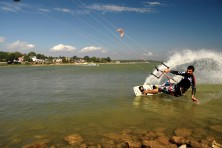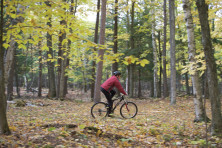Silent Sports Column
- Share
- Tweet
- Pin
- Share
Last week, our Arts, Entertainment & Literature Editor Alyssa Skiba came to my desk in the far reaches of the Pulse office to talk bikes.
After we got past the fear that cycling was giving her disproportionately sculpted calf muscles, she mentioned that her punishment for not participating in last weekend’s Peninsula Century Spring Classic will be finishing the 62-mile Fall Challenge ride in September. I told her to just do the 100-mile ride. She looked at me like I was crazy.
It may sound patronizing for me to act like a Nike spokesperson, saying “Just do it” to everyone that has endurance sport goals, but there was a long time before I was biking hundreds of miles and winning races myself.
When I was eight years old, I ran in the Thanksgiving Turkey Trot 5k in my hometown. There was an out and back segment, where all a runner needed to do to cut half a mile off the course was swing left and cross some cones. Convincing myself that 3.1 miles was too much to expect from an eight year old, I cut the course and finished a few minutes faster. In my mind, the only way to participate was to go as fast as I could. And I couldn’t do that for more than three miles, so I hopped the cones.
This perception, that an event is only worth participating in if you’re fast, is both popular and wrong. Long events, such as the Door County Century rides, are better understood as all-day events with food, fresh air, good company and some cycling in between.
In the summer of 2012, I rode my bicycle from Milwaukee to Burlington, Vermont. The trip took 11 days of riding at approximately 90 miles per day. When people asked how I could physically do that, I told them that it wasn’t physical.
The riding was slow and easy, but staring at my handlebars for nine hours a day took some getting used to. The challenge, in that ride and every other long distance endeavor I’ve tackled, was mental. But when I woke up without cell phone service, laundry, dishes or work, and the only thing on my to-do list was to get on my bike and ride it, the mental block got a little weaker.
Instead of looking at these events as a timed challenge with a finish line, view it as a day where you have nothing to do but keep moving forward.
Send your support for Alyssa’s 100-mile goal or any questions on training, racing or nutrition to [email protected].


